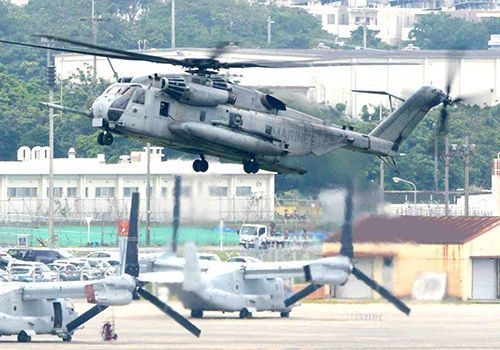Futenma noise pollution lawsuit monetary award lowered over 30% in appeal ruling

A U.S. CH-53 Sea Stallion heavy-lift transport helicopter landing at MCAS Futenma. In the background is the MV-22 Osprey. April 16, 9:30 a.m. Ginowan
April 17, 2019 Ryukyu Shimpo
The ruling for the appeal in the 2nd Futenma noise pollution lawsuit, in which the 3,415 residents who live in the area around MCAS Futenma filed suit seeking a substantive flight stoppage as well as compensation for both past and future damage, was handed down by the Fukuoka High Court Naha Branch April 16.
Presiding Judge Shodo Okubo, in keeping with the ruling in the initial trial, recognized the illegality of the noise pollution, however he rejected the request to stop flights.
Furthermore, the judge changed the base amount of the monetary compensation, reducing it by over 30%. The judge did order the payment of the previously owed amount of around 2.12 billion yen.
The question of if the U.S. and Japan’s “Futenma Base Agreement” was dismissed.
After the ruling, the plaintiffs held a press conference in Naha. Zenji Shimada, who leads the plaintiff group, said, “Since the amount of the fairly established compensation was been painfully reduced, we cannot approve of this decision,” criticizing the decision.
The counsel group announced that they would be appealing the ruling to a higher court.
In his ruling, Judge Okubo agreed with the original ruling, acknowledging that the residents suffered disruption to their daily lives, mental anguish, and sleep issues due to the noise of U.S. military aircraft.
However, he rejected the claim of damage to resident’s health in the form of an increased risk of hypertension, commenting, “It is difficult to accept that this is caused by noise pollution alone.
” Furthermore, the court reduced the monthly monetary award paid to plaintiffs who experienced 75 or more decibels of noise pollution from 7,000 yen to 4,500 yen, and the award for plaintiffs who experienced 80 or more decibels of noise pollution from 13,000 yen to 9,000 yen.
Future noise pollution damages were not awarded. Also, the claim of an increase in infrasound damage and damage from Osprey helicopters was dismissed, with the court saying, “there is insufficient evidence.”
The court also ruled that the damage suffered by residents outside of the key areas on the noise pollution contour map, “must be deemed relatively smaller than the zones of 75-decibels and above,” and compensation was not awarded.
The request for a flight stoppage was also rejected, with the court agreeing with the previous ruling, stating, “We are not in a position to regulate the flight of U.S. military aircraft.”
The request for a ruling on whether or not the base agreement infringed on the constitution was rejected after being deemed outside the scope of the trial.
In the November 2016 ruling at the Okinawa Branch of the Naha District Court, the 3,395 plaintiffs were awarded damages totaling 2.5 billion yen, however no other demands were granted. Both the plaintiff group of residents and the Japanese central government appealed the ruling.
(English translation by T&CT and Sam Grieb)
Previous Article:Skip Martin of Grammy-winning Dazz Band made Okinawa goodwill ambassador
Next Article:Tomohiro Yara wins Okinawa No. 3 district Lower House by-election with platform opposing new Henoko base
[Similar Articles]
- Futenma roar appeal dismissed by Supreme Court without issuing a flight ban
- Japanese government ordered to pay 754 million yen compensation for Futenma noise pollution
- Japan ordered to pay 1.3 billion yen to residents around MCAS Futenma in second lawsuit
- In third Kadena noise lawsuit, demand for flight injunction dismissed but 30.2 billion ordered in damages
- In second Futenma noise lawsuit, court rejects demand for flight ban, claims of unconstitutionality
 Webcam(Kokusai Street)
Webcam(Kokusai Street)


